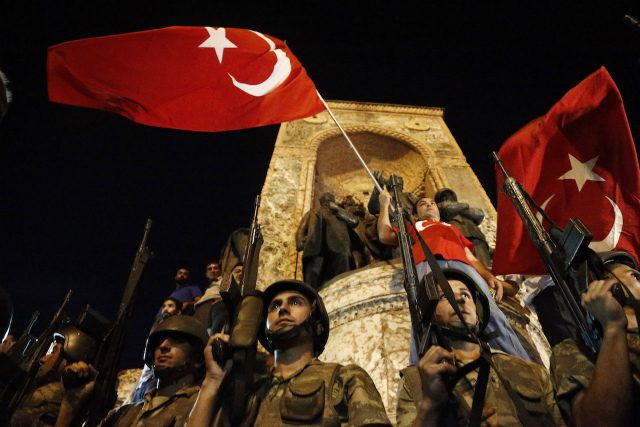SUMMARY
This is AI generated summarization, which may have errors. For context, always refer to the full article.

ANKARA, Turkey – A Turkish army faction backed by tanks and fighter jets launched a coup attempt overnight against President Recep Tayyip Erdogan, a bid top officials said they had foiled by Saturday, July 16.
Here is what we know so far:
Who was behind the coup?
A group calling itself the “Council for Peace in the Homeland” declared martial law and a curfew late Friday, saying it had launched the coup “to ensure and restore constitutional order, democracy, human rights and freedoms and let the supremacy of the law in the country prevail…”
No named military officer claimed responsibility for the actions.
Erdogan put the blame for the coup on supporters of his arch-foe, US-based Turkish cleric Fethullah Gulen, whose Hizmet movement has a powerful presence in Turkish society, including the media, police and judiciary.
Gulen denied being behind the coup attempt and condemned it “in the strongest terms”.
How did government react?
Government-backed jets downed pro-coup aircraft and bombed tanks surrounding the presidential palace in the capital Ankara.
Dozens of soldiers backing the coup surrendered on the Bosphorus bridge in Istanbul they had held throughout the night, holding their hands above their heads as they were detained.
Nearly 200 soldiers surrendered at the military headquarters in Ankara on Saturday, the state-run Anadolu news agency reported. An official said special forces were currently securing the complex. (IN PHOTOS: Turkey military coup)
Istanbul authorities sought to make a show of normalization with the bridges reopening to traffic and Ataturk International Airport – which had been shut down by the plotters – gradually reopening.
But Erdogan, who had called on people during the night to take to the streets to help foil the coup, urged them in a late morning Twitter message to stay out “because a new flare-up could take place at any moment”.
Who is in control?
Turkish Prime Minister Binali Yildirim said in Ankara on Saturday “the situation is completely under control.”
He was flanked by the ministers of justice and interior as well as Turkey’s top general outside his offices in the capital.
The acting army chief, General Umit Dundar, said earlier that the coup attempt had been foiled.
Authorities had regained control of the parliament, which was hastily reconvened into a session broadcast live on television.
A total of 2,839 soldiers had been arrested, Yildirim said.
Erdogan flew back to Istanbul in the early hours of Saturday, saying the hotel he was staying at on Turkey’s Aegean coast was bombed after he left.
Erdogan appointed Dundar, commander of the First Army, as acting chief of staff after General Hulusi Akar was captured by putschists.
Akar was later rescued, the private TV station CNN-Turk reported.
How many casualties?
More than 250 people have been killed overall.
Yildirim said Saturday 161 people had been killed and that 1,440 had been wounded, while acting army chief General Umit Dundar said 104 coup plotters were dead.
Erdogan had called his supporters out onto the streets, and in several locations they outnumbered putsch soldiers.
Putsch troops had moved to block the bridges across the Bosphorus Strait in Istanbul, and an AFP photographer saw soldiers open fire on people gathered near one them, leaving dozens wounded.
Soldiers also shot at protesters angrily denouncing the coup bid at Istanbul’s famous Taksim Square, injuring several.
Explosions rocked areas near official buildings as government aircraft sought to eject pro-coup tanks.
How did the world react?
NATO chief Jens Stoltenberg hailed the “strong support shown by the people and all political parties to democracy and to the democratically elected government of Turkey,” a key NATO ally. (READ: World powers urge ‘stability’ in Turkey)
Russia’s foreign ministry said the coup attempt, coupled with terrorist threats in Turkey and armed conflict in neighbouring countries, “brings a heightened risk to international and regional stability.
French Foreign Minister Jean-Marc Ayrault also said his country “hopes that Turkish democracy will emerge strengthened from this test and that fundamental freedoms will be fully respected. – Rappler.com
Add a comment
How does this make you feel?
There are no comments yet. Add your comment to start the conversation.